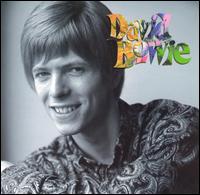
- Format: MP3

In 1973, at the height of David Bowie's Ziggy-shaped excess, a small, smirking skeleton came creeping out of his closet, paused to adjust its merry pointy hat, then rocketed to number eight on the U.K. chart. It was, of course, "The Laughing Gnome," a reminder of his days directionlessly drifting through the '60s, and a cause for ribald amusement wherever it played. Today, of course, Bowie is no stranger to embarrassment...nor to "The Laughing Gnome." What, after all, was his role in the Labyrinthe movie but a twisted reprise of the Gnome's naughtier excesses, while his Earthling album even offered its own return to the same kind of basics, including the varispeed vocals that made the Gnome laugh. But Bowie still remains acutely aware of the nature of his musical roots. Initial intentions for this compilation included a second disc packed with outtakes and oddities; these plans were abandoned at Bowie's own request (the bootleg The Forgotten Songs of David Robert Jones celebrates his demands), and Anthology suffers accordingly. Of its 27 tracks, a mere handful can be missing from even a disinterested Bowie collection — the Love You Till Tuesday soundtrack version of "Ching A Ling," and a handful of re-recordings made for 45 release. Everything else has now been repackaged so many times that even fresh remastering at first seems academic. And then you play the album. And then you play "The Laughing Gnome." Though Bowie plotted a similar course through the mundane backwaters of nostalgic Englishness as fired Ray Davies' best contemporary efforts, it's not difficult to understand why this work was doomed to commercial failure. He was, at this time, targeting most of his energy directly into the heart of the Hip Easy Listening Intelligentsia — without pausing to wonder whether that crowd actually existed. Of course it didn't, and Bowie was doomed before he got started. Too twee for mainstream rock tastes, and way too heavy for the Anthony Newley crowd with which subsequent critics have most gleefully allied him, Bowie's subject matter was essentially little different to anything he has written about in the decades since then. If anything, in fact, it was even darker — child abuse ("Little Bombardier"), cannibalism (the magnificently apocalyptic "We Are Hungry Men"), and infanticide ("Please, Mr. Gravedigger") vied with what might now be called the more characteristic themes of transvestism ("She's Got Medals") and sci-fi inflected utopia ("There Is a Happy Land"). Rearrange the songs a little and, thematically, "The London Boys" — a tale of betrayed modishness that takes the Kinks' similarly themed "Big Black Smoke" to its inevitable, lonely conclusion — would not have been out of place on Bowie's own Pin-Ups. The soaring, soulful "When I Live My Dream" could easily have lived with Young Americans, while the impulsive "Let Me Sleep Beside You" still demands a modern reprise. Elsewhere, "Ching A Ling" lent part of its melody line to the subsequent "Saviour Machine"; "Karma Man" was still appearing in Bowie's live set into the early '70s; and "Space Oddity," present here in early demo form, would of course become one of his most enduring hits ever. But in allying all this incipient brilliance to a distinctly MOR soundtrack of piano, strings, and orchestral arrangements, Bowie was shooting himself in the foot, and today, excellent liner notes and a topnotch remastering job do not disguise the sheer unconventionality of this material. Even now, with his subsequent reputation as a musical chameleon firmly a part of his legend, "Silly Boy Blue," "Maid of Bond Street," and "There Is a Happy Land" remain disconcerting members of his canon. At the time, they were positively alien, and even Bowie would take another five years before he learned to understand that.